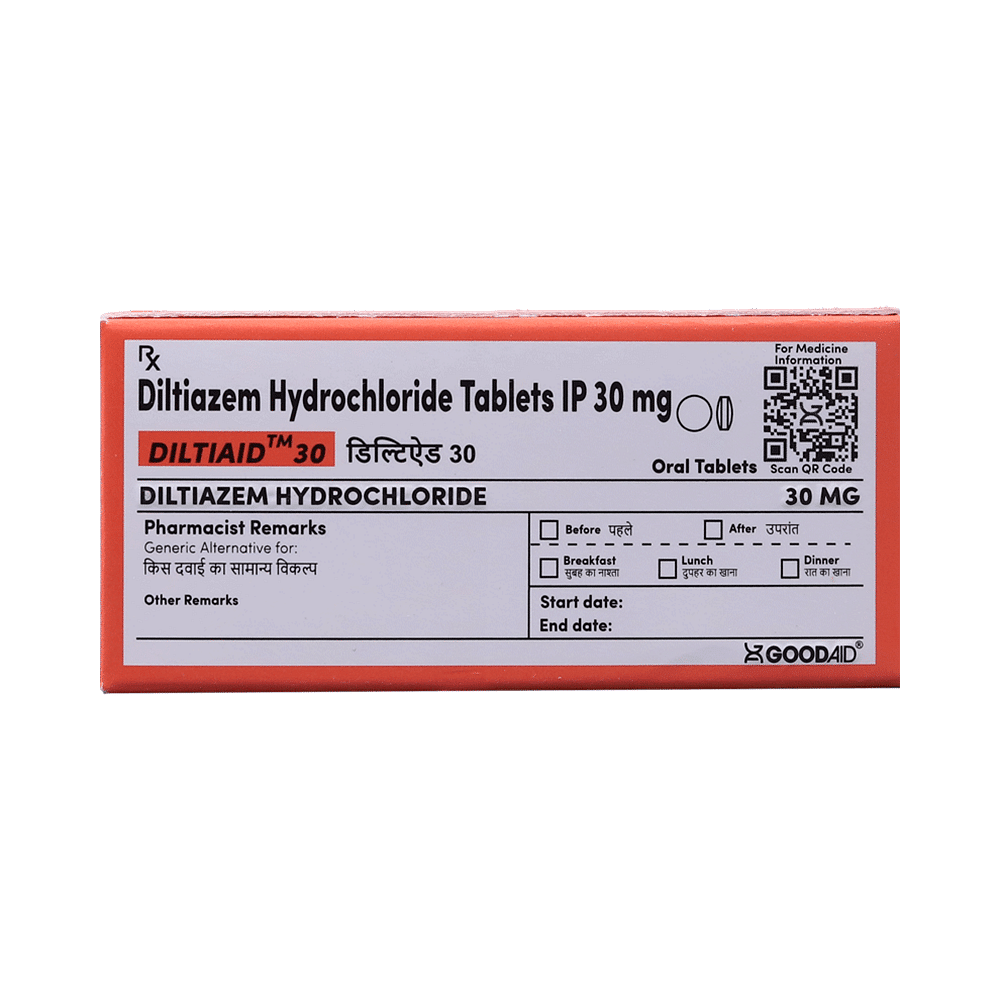
DICARD 30MG TABLET
Manufacturer
Intas Pharmaceuticals Ltd
Salt Composition
Diltiazem (30mg)
Key Information
Short Description
DICARD 30MG TABLET is used to treat angina (heart-related chest pain), high blood pressure, and some types of irregular heartbeats (arrhythmia).
Dosage Form
Tablet
Introduction
DICARD 30MG TABLET may be taken with or without food, but it is better to take it regularly at a fixed time each day as advised by your doctor. Keep using this medicine even if you feel well. If you stop taking it suddenly, your condition may worsen. This medicine is only part of a treatment program that should include a healthy diet, regular exercise, and weight reduction as advised by your doctor.
Directions for Use
Take this medicine in the dose and duration as advised by your doctor. Swallow it as a whole. Do not chew, crush, or break it. DICARD 30MG TABLET may be taken with or without food, but it is better to take it at a fixed time.
How it works
DICARD 30MG TABLET is used to treat angina (heart-related chest pain), high blood pressure, and some types of irregular heartbeats (arrhythmia). It is known as a calcium channel blocker. It works by relaxing blood vessels to lower blood pressure. This helps to reduce the workload of the heart.
Quick Tips
DICARD 30MG TABLET slows down the heartbeat and allows the blood vessels in the body to relax. This helps prevent angina attacks (chest pain caused by heart disease), certain abnormal heart rhythms, stroke, and heart attack. It may cause you to feel lightheaded or weak especially when you stand up (orthostatic hypotension). Rise slowly if you have been sitting or lying down. It is best to avoid drinking alcohol while taking DICARD 30MG TABLET as it may make the side effects worse. Do not stop taking it suddenly without talking to your doctor first.
Related Medicines

Diltiaid 30 Tablet

DILGINA 30MG TABLET

Dilocor 30mg Tablet

Diltp 30mg Tablet

MASDIL 30MG TABLET

Dilcare 30mg Tablet

Diltilong 30mg Tablet

Diltiaz 30mg Tablet

DILGARD 30MG TABLET

Diltime 30mg Tablet
Frequently asked questions
Is DICARD 30MG TABLET a blood thinner?
No, DICARD 30MG TABLET is not a blood thinner. It belongs to the calcium channel blocker class of medicines and is used to treat hypertension, arrhythmias and angina (chest pain caused by a reduction of oxygen to the heart muscle).
Does DICARD 30MG TABLET cause weight gain?
While some patients may experience increased weight on DICARD 30MG TABLET, it is not a common side effect and does not occur in all individuals. If you are experiencing significant weight gain, consult your healthcare professional for guidance.
Is it better to take DICARD 30MG TABLET in the morning or at night?
It is generally recommended to take DICARD 30MG TABLET at night before meals. Your doctor will provide individualized dosage recommendations and instructions for proper usage.
Does DICARD 30MG TABLET affect sleep?
Some patients may experience sleep disturbances with DICARD 30MG TABLET. If you notice persistent insomnia or other sleep difficulties, consult your doctor to discuss potential solutions.
Who should not take DICARD 30MG TABLET?
Individuals with known allergies to DICARD 30MG TABLET should avoid its use. Additionally, those with pre-existing conditions such as a rapid or slow heart rhythm, heart failure, and low blood pressure should consult their physician before taking this medication.
What are the symptoms of an overdose of DICARD 30MG TABLET?
Overdose symptoms may include irregular heartbeat (fast or slow), dizziness, confusion, nausea, vomiting, sweating, difficulty breathing and loss of consciousness. Seek immediate medical attention in case of any suspected overdose.
How long do I need to take DICARD 30MG TABLET? Can I stop it on my own?
Your doctor will determine the duration of treatment based on individual needs. Do not self-discontinue or adjust the dosage without consulting your healthcare provider. Sudden dose changes could potentially worsen angina or cause a rise in blood pressure.
What should I avoid while taking DICARD 30MG TABLET?
You should refrain from consuming alcohol while on DICARD 30MG TABLET. Additionally, it is recommended to avoid driving or operating machinery if you experience dizziness due to the medication as this could pose safety risks.
What are the serious side effects of DICARD 30MG TABLET?
Serious adverse reactions associated with DICARD 30MG TABLET include severe allergic reactions, yellowing of the skin or eyes, nausea and extreme tiredness. Other possible complications may involve blood coagulation problems, unusual bleeding or bruising, lack of appetite, stomach pain and general malaise, flu-like symptoms, and increased frequency or severity of chest pain (angina). Contact your healthcare provider if experiencing any such adverse effects.


